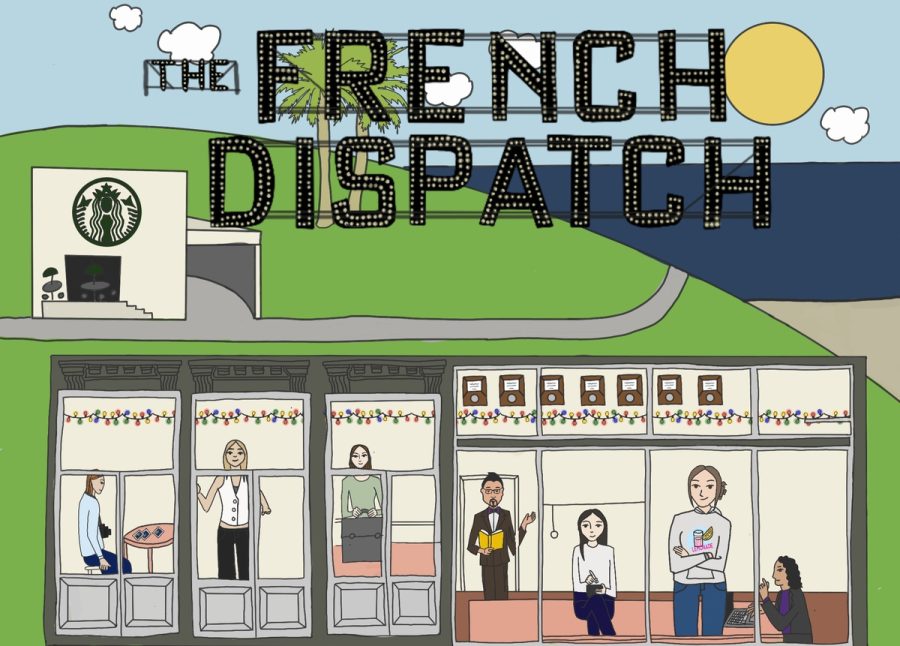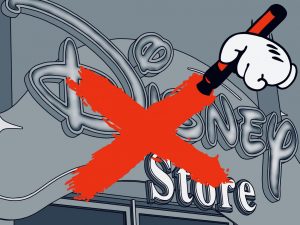“Les enfants sont gorgon” A youth’s perspective on The French Dispatch
The editors of The Foothill Dragon Press illustrated in the style of The French Dispatch.
November 22, 2021
Wes Anderson’s The French Dispatch is a film about an international syndicate based in the made-up French town of Ennui-sur-Blasé. The newspaper is preparing its final issue, and each section of the magazine breaks off into a black-and-white short that recounts the journalist’s memories of the assignment. The theater is empty, besides a group of maskless seniors, who were not amused by Anderson’s bawdiness.
The French Dispatch is the type of film that grows on you the more you think about it. At first thought, maybe your mom fell asleep during the movie, and you spilled sour patch kids everywhere and wished that Timothée Chalamet had more screen time.
But as you spend more time in “Boredom-on-Apathy,” Anderson tugs on your American francophone heart as the ironically cheerful town that couldn’t be bothered to care pulls you in deep. The French Dispatch is heartfelt, ironic, but most of all highly satirical. Nothing is spared: The New Yorker, modern art, student revolutions, the police, Americans, France, Kentucky, journalists and editors.
The French Dispatch is hilarious in retrospect. But in the near-empty theater, Anderson’s sense of humor was intimidating. I found myself wondering, after each little quip, “Is this meant to be funny? Or am I just stupid?”
But Anderson’s subtle humor is just another feature of the movie’s intrinsic sense of boredom. His snark is coated in the heavy sense of listlessness of “Ennui-sur” which makes it seem like he couldn’t bring himself to be explicitly funny.
One review for Vox speaks fondly of The French Dispatch but reproaches it as boring. When it comes to Anderson’s intentions, the only thing I know for sure is that this film is meant to be boring.
It’s all about transporting the audience to Ennui-sur-Blasé, to Anderson’s dreamscape. It’s as if he wanted the audience to feel the boredom of Ennui-sur-Blasé and be subjugated to actual ennui which enhances the movie’s spellbinding quality. You will be bored watching The French Dispatch, this I can guarantee, but you will be bored in Ennui, not in your seat at the movie theater.
The French Dispatch invokes nostalgia for a time passed—or so the grown-ups who reviewed it say. Something about post-war innocence. As for younger viewers, The French Dispatch was a reflection of a time that I don’t remember. But the madeleine dipped in tea, so to speak, took my mind to the closest association I have to the innocence of that time period: an enchanting, old-timey Disneyland attraction.
Ennui-sur-Blasé is like Wes Anderson’s own Main Street, U.S.A. It seems that if you tried to open a door in Ennui you’d find that it was a fake door. And if you looked up, you’d see windows with nothing behind them. The two-dimensional feeling lends itself to Ennui’s surrealist mood.
I don’t know if I would’ve enjoyed The French Dispatch as much as I did without some newsroom experience. Anderson really captured the newsroom family feeling, even if it was washed in apathy. The journalists’ reaction to their editor’s death was priceless; the group was near indifferent as they got right to work on his obituary.
Reality is a nightmare after watching The French Dispatch. I stumbled out from the streets of Ennui into the California fog, shocked and disappointed to realize that Moses Rosenthaler isn’t an actual artist.














